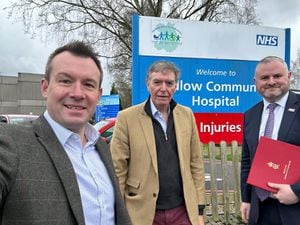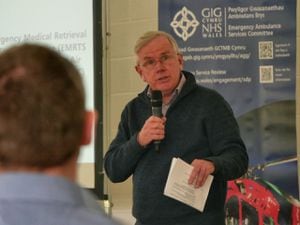Fewer than half of Shropshire smokers manage to quit using council service
Fewer than half Shropshire people using the NHS Stop Smoking Service managed to quit, according to the latest figures.

In the 12 months from April 2017 to March this year, 2,408 people in Shropshire signed up with the NHS Stop Smoking Service and set themselves a date to quit.
At follow up meetings four weeks later 1,138 people said they had given up, according to data from NHS England. That's 47 per cent, which is below the average rate for England of 51 per cent during the period. The average for the West Midlands was 49 per cent.
In Telford 1,636 people in Telford and Wrekin signed up and four weeks later 781 people confirmed they had given up. At 48 the figure was slightly higher than those covered by the Shropshire Council area.
The success rate is based on self-reported results of people who said that they had not had a puff for two weeks since their quit date.
But 39 per cent of those who set a date proved they had kicked the habit by having a test that checks carbon monoxide in their bloodstream. In Telford the figure was 36 per cent.
The Stop Smoking Service has been provided by local authorities rather than the NHS, since 2013.
It offers support, with one-to-one counselling or group sessions. Medicines that help with nicotine cravings can also be prescribed, while some people also use over-the-counter products. The data shows that 33 quitters succeeded with a cold turkey approach with no chemical substitutes for cigarettes. In Telford 15 managed the feat.
The total cost of the service in Shropshire was £295,000 – £259 for each person that quit.
In Telford it was was £320,552 – £410 for each person that quit.
Latest figures from Public Health England show that 14 per cent of the adult population of Shropshire are smokers and 16 per cent of the Telford & Wrekin population.
Budgets
The campaign group Action on Smoking and Health (ASH) says that the popularity of e-cigarettes as an aid to quitting explains some of the decline in users of the service across England but not all of it.
They say tighter council budgets, less publicity nationally about services and an apparent reduction in GPs prompting people to take up the service may also be to blame.
Hazel Cheeseman, Director of Policy at ASH, said: "We want to see investment going back into funding these services through local authorities. We need the NHS to step up in its referral of people to stop smoking services and we’d like to see greater investment in mass media campaigns to make smokers aware of these services."
The data shows that in Shropshire, men had more success than women with 51 per cent quitting compared to 42 per cent of women. In Telford the split was 51 per cent of men and 46 per cent women.
The services also record if women were pregnant when they signed up and the figures show that 42 per cent in Shropshire managed to stop smoking, with only 26 per cent in Telford.
Some local authorities no longer provide NHS Stop Smoking Services and some did not supply complete data. Of the 141 that did, the highest quit rate was 80% in Croydon and the lowest was 24% in Cumbria.
Martin Dockrell, tobacco control lead at PHE said: "If you’re not a smoker, don’t start and don’t vape. If you’re a smoker, quit now and consider using an e-cigarette as an aid. Using an e-cigarette along with support from your local Stop Smoking Service gives you the best chance of quitting successfully.”





